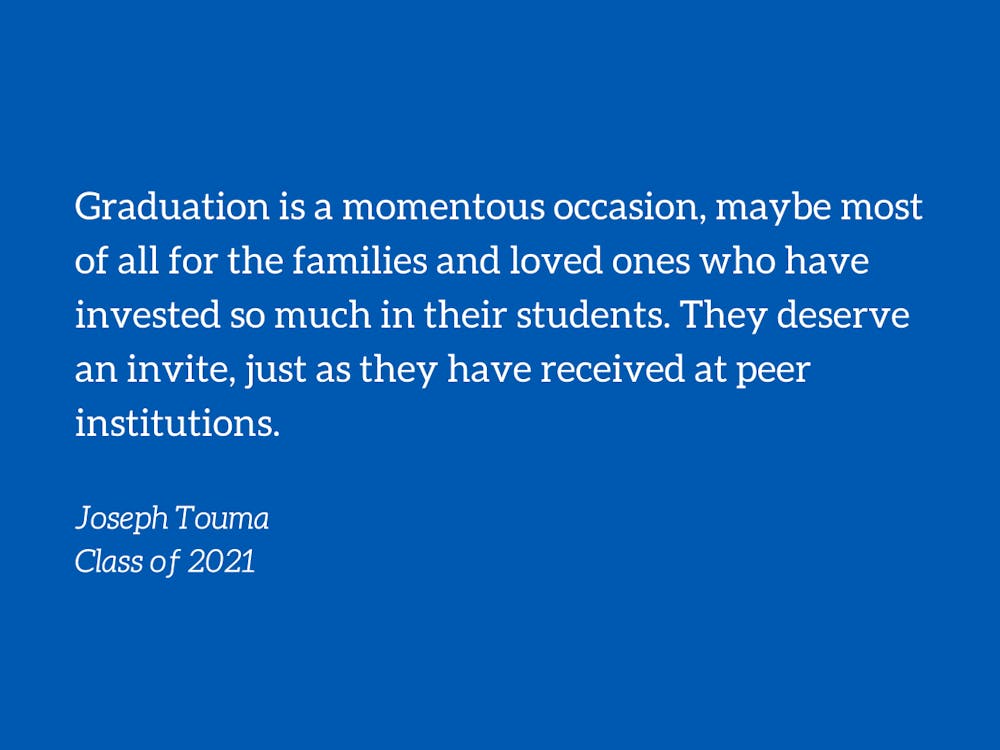On March 2, President Price announced plans for a "limited, in-person commencement ceremony" for the Class of 2021, forbidding guests from attending due to public health concerns. This announcement was shocking for many families, with the event representing the successful conclusion of a monumental chapter in their students' lives. For some, their son or daughter will be the first in their family to graduate from college. For others, the occasion marks an important coming-of-age event observed in their family for generations. For all, the inability to witness graduation will be devastating.
Elsewhere in the South, peer institutions like UNC-Chapel Hill and Vanderbilt have announced plans to allow students to invite two guests to their graduation ceremonies. What's more, Dr. Anthony Fauci, our nation's leading infectious disease expert, is speaking at graduation festivities for both institutions, publicly associating his name with the events. Would Dr. Fauci speak in these settings, implicitly approving their planning, if the events posed a public health threat? Certainly not—Dr. Fauci has long advocated that we “follow the science.” Rather than following Fauci’s advice, Duke is casting science aside to make room for a meager, sparsely-attended affair.
What, exactly, does science say? The transmission of COVID-19 in outdoor settings is quite rare, nearly 20 times less likely than transmission indoors. COVID-19 is primarily transmitted through the air, a mechanism thwarted by airflow and ventilation outside. Masking and social distancing further incapacitate the virus’s ability to spread. Duke’s commencement is slated to be held in Wallace Wade Stadium, a 40,004 seat venue on West Campus. This setting allows ample room for distancing, even if students were allowed two guests. Assuming all 1,600 graduates invited two guests, roughly 4,800 students and families would be in attendance. Add to that Duke’s 1,688 faculty members and you will arrive at 6,488 attendees (assuming every professor is invited, and decides, to attend). Ultimately, this (inflated) figure would still allow one person per every six seats, exemplifying social distancing. With these facts in mind, a masked outdoor graduation ceremony poses virtually no transmission threat for its attendees.
Even so, some might be inclined to argue that inviting guests to the ceremony would cause an influx of travelers to Durham, risking the health of these individuals and the local community. This argument holds little water. Many families are still planning to come to Durham on graduation weekend. Within 15 minutes of Duke’s announcement to move graduation forward one week, popular hotels (including the Washington Duke, JB Duke, and Hilton Garden Inn) were sold out for the weekend of May 2nd. Families want to be here for their child’s graduation, even if they are being shut out from the main event. In other words, this risk is already baked in—many loved ones will visit Durham regardless of Duke’s decision to preclude their attendance at the graduation ceremony.
Such behavior also suggests that many families feel comfortable traveling to Durham, presumably a result of encouraging virus trends in the United States. The numbers of new cases have plummeted since mid-January, with daily infections falling by nearly 90%. Over a quarter of the US population has received at least one dose of a COVID-19 vaccine, a number expected to rise dramatically in the coming weeks. Duke students will get access to doses starting April 1, and access to vaccines for the entire adult population has already been granted in states from Texas to Indiana. It is safe to assume that many, if not most, attendees of the commencement ceremony will have received at least one dose by the end of April.
Throughout the pandemic, Price’s administration has exhibited courageous leadership, setting the example for institutions across the country by taking bold, calculated risks. Why should now be any different? In his March 2 announcement, President Price promised: “Should conditions improve, we may consider expanding the scope of the ceremony.” Today, we find that conditions are improving on almost all fronts. Now is the time for President Price to keep his promise and to exhibit the courageous leadership Duke needs, taking advantage of the strides our University and country have made in fighting this pandemic. Graduation is a momentous occasion, maybe most of all for the families and loved ones who have invested so much in their students. They deserve an invite, just as they have received at peer institutions. If it’s good enough for Fauci, it should be good enough for Duke.
Joseph Touma is a Trinity senior.
Want to respond to this opinion piece or submit one of your own? Visit this page for information on guest columns and letters to the editor.
Get The Chronicle straight to your inbox
Signup for our weekly newsletter. Cancel at any time.

